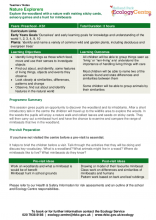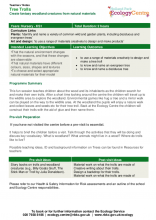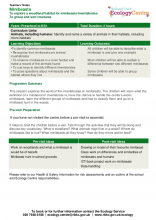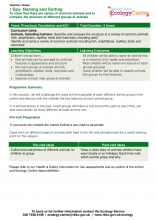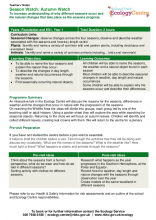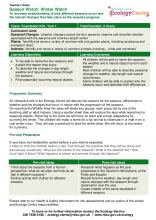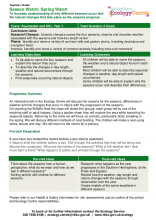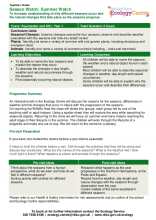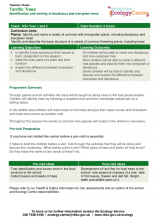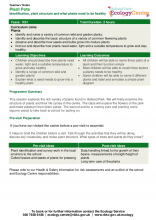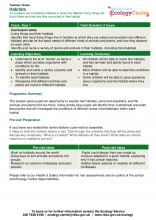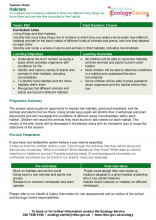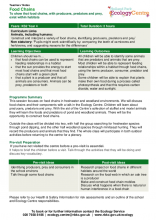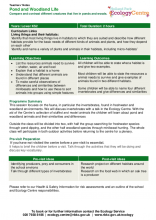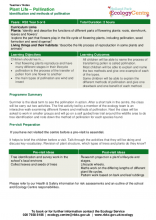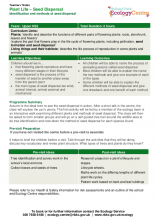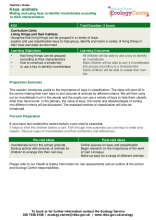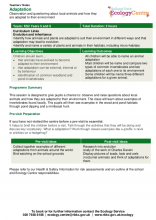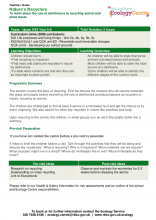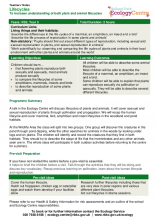Environmental education

The Holland Park Ecology Centre is a purpose-built environmental education centre providing a range of outdoor nature-based sessions suitable for groups of all ages. The centre is well resourced with:
- a range of scientific equipment
- projector
- live and static wildlife specimens
- practical facilities including toilets and bag storage.
Outdoor investigations take place in the Holland Park Wildlife Area, a secured fenced site which features a wildlife pond with a dipping platform and woodland and grassland habitats.
Sessions are led by our education team, all of whom are experienced environmental educators and level 3 Forest School leaders. They also all hold outdoor first aid certificates and enhanced DBS checks.
Environmental education sessions are two-hour curriculum-linked workshops for groups for early years and upwards. Sessions typically start in the Ecology Centre with an interactive introductory talk explaining the topic and outlining the objectives. This is followed by time in the Wildlife Area exploring and learning outdoors and ends with a brief review.
Environmental education sessions cover a diverse range of topics, with natural exploration including:
- minibeast hunts
- pond dipping
- tree studies
- edible plants
- seasonal change.
- natural art workshops.
Sessions are for groups of up to 30 children at a time with accompanying adults.
If you would like to plan a school or class visit, check the workshop details below and contact the Ecology Centre to discuss the various options available for your class.
- Arranging your visit
-
If you would like to arrange your visit or if you have a general enquiry, contact us.
After we receive your request, we will email you to confirm the date, timings and details of your booking. A formal confirmation email will then be sent containing our risk assessment, health and safety procedure, and teacher notes. The group leader should read and agree this information before their visit to the Ecology Centre.
Essential preliminary visit
We recommend that prior to their visit, teachers take the opportunity to visit the Ecology Centre and familiarise themselves with the location and resources to ensure that pupils get the most from their trip.
Group leaders who have not visited the Ecology Centre before are requested to book a pre-visit to:
- familiarise themselves with its facilities and the site
- and to discuss the needs of the group and any logistics.
- Preparing for your visit
-
Health and Safety
- All our sessions have been risk assessed.
- Upon confirming a visit, teachers will be sent a copy of our Educational Visit Health and Safety Procedure and session-based risk assessment. Please ensure that you have read our risk assessment and shared it with any other group leaders.
- Visiting schools should also complete their own risk assessments. Please check with all participants (including accompanying adults) for any allergies such as wasp or bee stings, nuts, ivy.
- Do check the weather forecast but be prepared for wet conditions.
Recommended clothing and sundries
- Spring: waterproof jacket, sturdy footwear, long sleeved top, trousers/covered legs
- Summer: waterproof jacket, sturdy footwear, trousers/covered legs, sun hat, sun cream, water bottle.
- Autumn: waterproof jacket, sturdy footwear, long sleeved top, trousers/covered legs.
- Winter: waterproof and warm jacket, sturdy footwear, long sleeved top, trousers/covered legs, hat, gloves
We will run the session in all weathers unless conditions are deemed hazardous, for example, electrical storms or storm force winds. In cases of heavy rain, we may amend the session to spend less time outside or avoid more exposed areas.
Supervision
- All children must be supervised by adults while visiting the Ecology Centre.
- Maximum class size is 30.
- Teachers must take full responsibility for the group whilst attending the Ecology Centre sessions.
Recommended ratios of adults to children for visiting groups
- Early years: 1:4 ratio
- Infants: 1:6 ratio
- Juniors: 1:8 ratio
- On the day of your visit
-
The visit will start at the Ecology Centre and we recommend that the group are given the opportunity to use the toilets before the session starts.
Most sessions start with an interactive introductory talk in our classroom, often making use of our collection of stuffed and model animals, and demonstrating any equipment to be used during the session. We will then take the group outside, either for nature exploration activities in the Wildlife Area, plant studies using the park’s floral collection or into the Edible Teaching Garden to discover the various plants growing there. We will outline any health and safety issues relating to the outdoor activities.
During the session the group leader(s) take overall responsibility for the behaviour and welfare of the group. The Ecology Centre staff will ensure the safety of the group and take regular headcounts. The full roles and responsibilities are outlined in the Educational Visit Health and Safety Procedure.
After the completion of the outdoor activities we will return to the Ecology Centre for a brief review and to wash hands.
- After your visit
-
At the end of your visit we will ask the group leader to complete an evaluation form.
We have ideas for follow-up activities in the Teacher Notes sent with your confirmation email.
The Ecology Centre has Twitter and Facebook accounts and we always appreciate it when groups mention us when posting about their visits.
Our workshops
Please select the programme title below to view the Teachers' notes, including curriculum links, learning objectives and outcomes.
Visits are available all year round but please book early for the summer term as it is often fully booked.
- Preschool and Foundation Stage
-
Nature Explorers
Explore the park’s woodland with a nature walk and a hunt for minibeasts with a focus on science.
Tree Trolls
A creative craft session to create fantasy woodland creatures with a focus on cross-curricular.
Minibeasts
Learn about the range of creatures which can be termed minibeasts with a focus on science.
I Spy
Learn how to sort creatures into groups with a focus on science.
Autumn Watch
Search the woods for different signs of autumn (Autumn term only) with a focus on science.
Winter Watch
Focus on plant and animal adaptations for surviving the winter (Autumn term 2 and Spring term 1 only) with a focus on science.
Spring Watch
Explore the park spotting signs of spring (Spring term only) with a focus on science.
Summer Watch
Focus on spotting signs of summer around the park (Summer term only) which will aim at learning science.
- Key Stage 1 Programmes
-
Nature Explorers
Explore the woodland with a nature walk and a hunt for minibeasts with a focus on cross-curricular.
Minibeasts
Explore the woodland with a nature walk and a hunt for minibeasts.
Tree Trolls
A creative craft session to create fantasy woodland creatures with a focus on cross-curricular.
Terrific Trees
Journey through the park carrying out fun activities to learn about trees with a focus on cross-curricular.
I Spy
Learn how to sort creatures into groups with a focus on science.
Plant Pots
Learn about plant lifecycles and make paper plant pots with a focus on science.
Autumn Watch
Search the woods for different signs of autumn (Autumn term only) with a focus on science.
Winter Watch
Focus on plant and animal adaptations for surviving the winter (Autumn term 2 and Spring term 1 only) with a focus on science.
Spring Watch
Explore the park spotting signs of spring. (Spring term only) with a focus on science.
Summer Watch
Focus on spotting signs of summer around the park (Summer term only) which will aim at learning science.
Habitats
Learn how different living things are suited to their habitat with a focus on science.
- Key Stage 2 Programmes
-
-
Habitats
Compare the pond and woodland habitats with a focus on science.
Food Chains
Learn about food chains with a focus on science.
Pond and Woodland Life
Compare and contrast different creatures that live in the pods and woodlands with a focus on science.
Plant Life: Pollination
Explore the different ways plants are pollinated (Spring or Summer terms only) with a focus on science.
Plant Life: Seed Dispersal
Spot and identify species and their method of seed dispersal (Autumn term only) with a focus on science.
Keys Animals
Use different keys to identify invertebrates in two different habitats with a focus on science.
Adaptation
Learn how animals are best adapted to their habitat with a focus on science.
Nature's Recyclers
Learn about the role of detritivores and decomposers in the woodland and build a wormery with a focus on science.
Lifecycles
Learn about the different types of animal lifecycles. (Spring term 2 and Summer terms only) with a focus on science.
Classification
Explore how living things can be classified into broad groups with a focus on science.
-
- Secondary and Tertiary Education Programmes
-
We can tailor sessions to meet your learning needs. For GCSE, BTEC, A Level and tertiary groups, sessions can be designed in consultation with you and with reference to the specific course requirements.
Visits are available all year round but please book early for the summer term as it is often fully booked.
Food Chains
Study the components of a food chain with a focus on science.
Nature's Recyclers
Learn about the role of detritivores and decomposers in the woodland and build a wormery with a focus on science.
Invertebrate Population Study
Estimate the populations of different woodland invertebrate species with a focus on science.
Trees and Climate
Examine different features of tree species found in the park and how they relate to their climate with a focus on science.
Bioindicators
Learn how a species survey can be used to assess the quality of a habitat with a focus on science.
Fees and payment
Environmental Education Session fees and charges April 2025 to March 2026.
These charges have been set and agreed by the Cabinet member for Environment and Neighbourhoods in March 2025.
| Environmental Education Session | RBKC state funded schools | RBKC private schools and non-RBKC schools/groups |
|---|---|---|
| Workshop led by single Ecology Staff member – up to 2 hours (approx. 30 children) | £94 | £128 |
| Ecology Centre talk (half an hour). Charge for self-led visits that use the Centre. | £41 | £41 |
| Attendance charge for using wildlife area or natural play area (per pupil) – up to 2 hours. This is for self-led groups, either Environmental Education or Forest School. | £3.50 | £4.50 |
- You will receive an invoice from the Ecology Centre.
- Invoices must be paid in full within 30 days of the invoice date.
- Once the payment has been received, we will send you a confirmation email.
- Please note that we cannot accept cash payment on the day.

